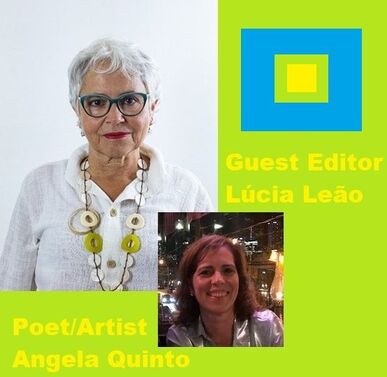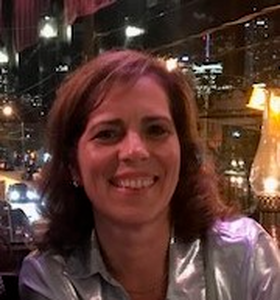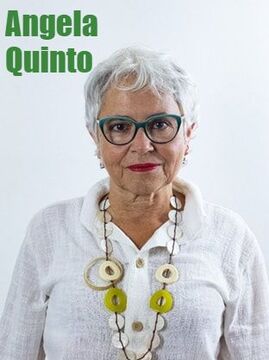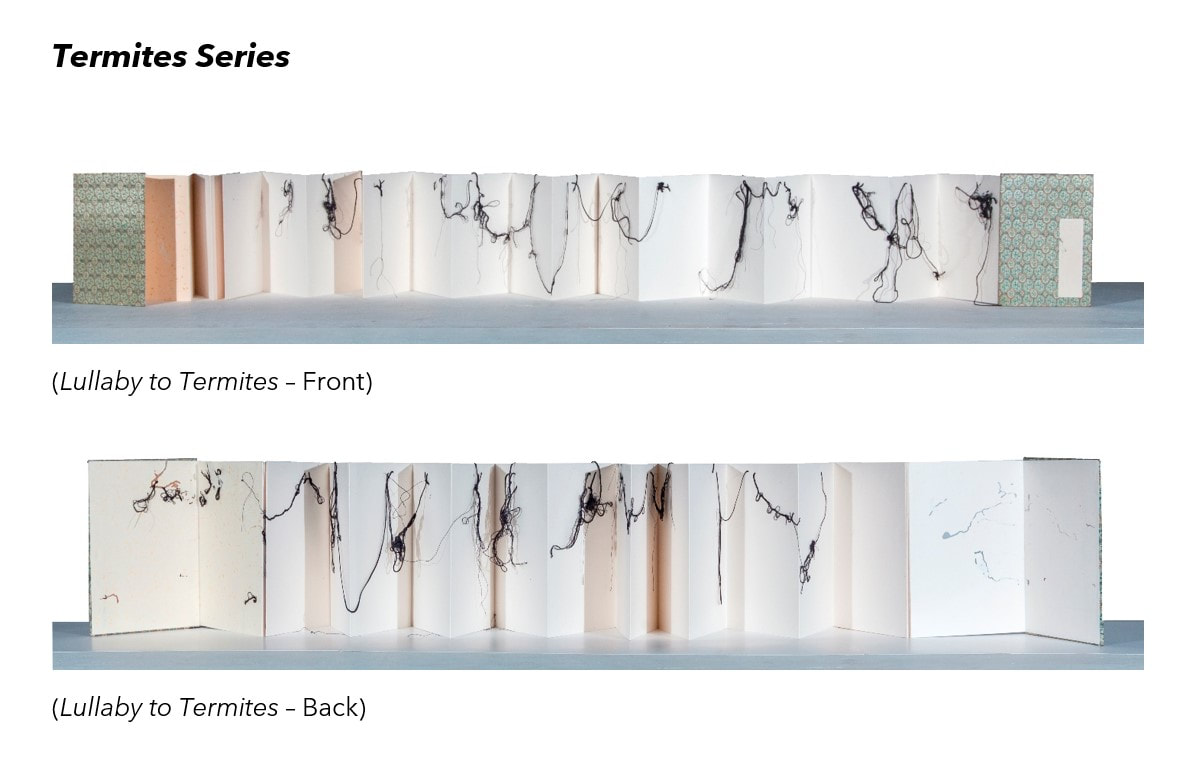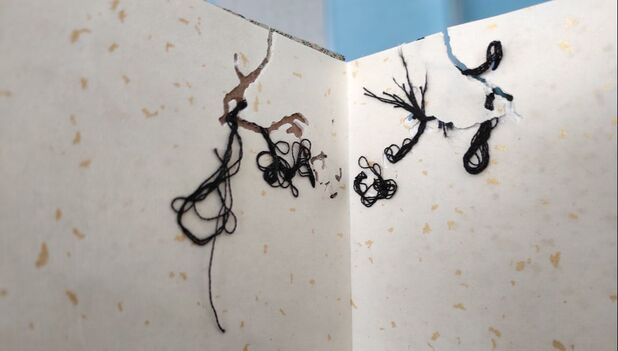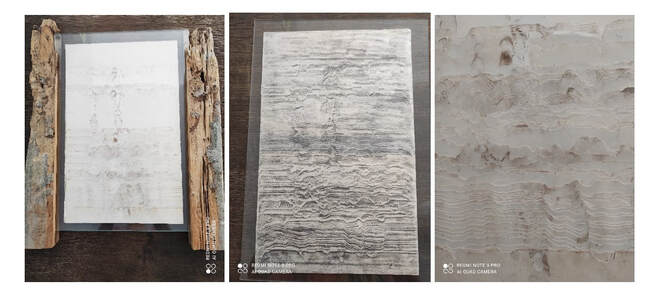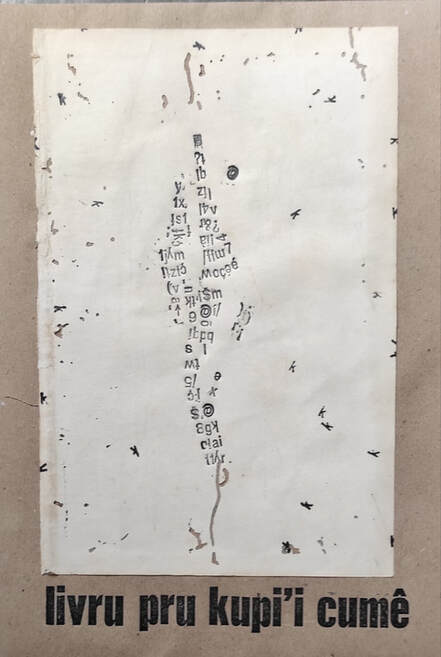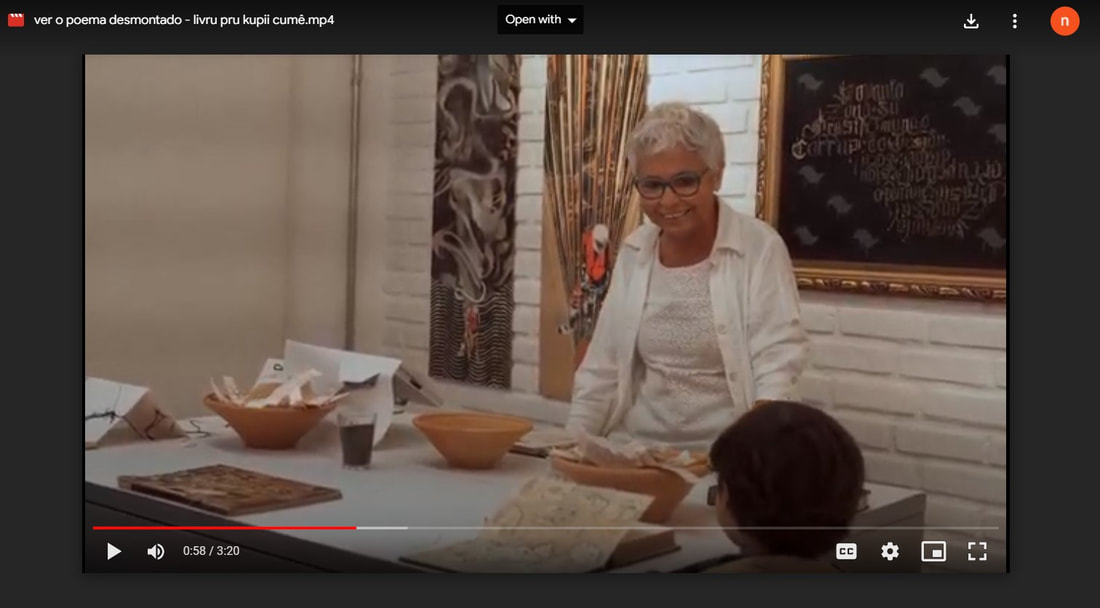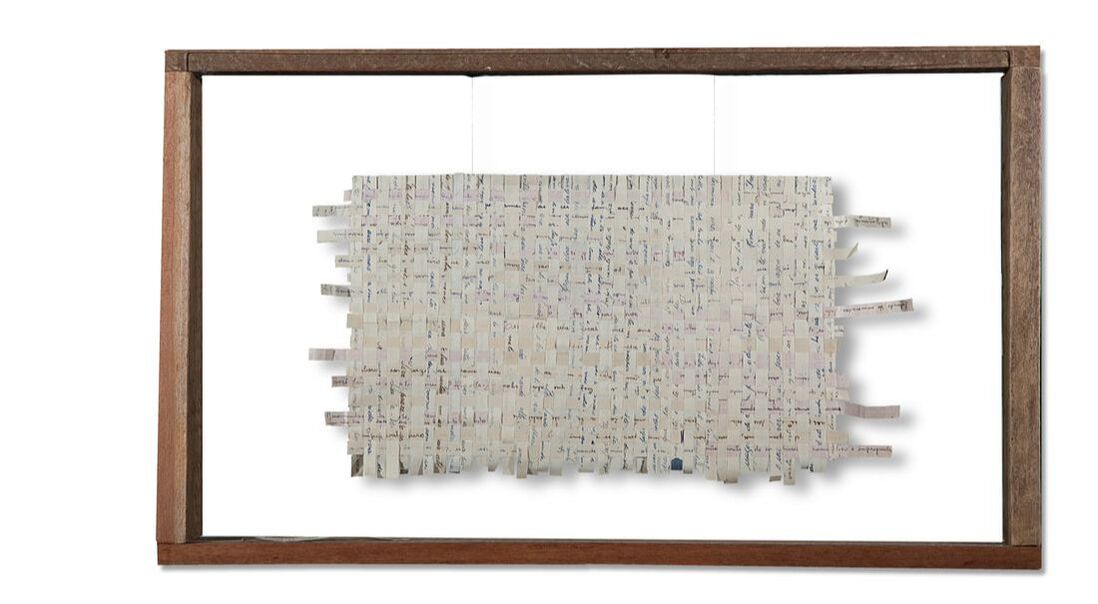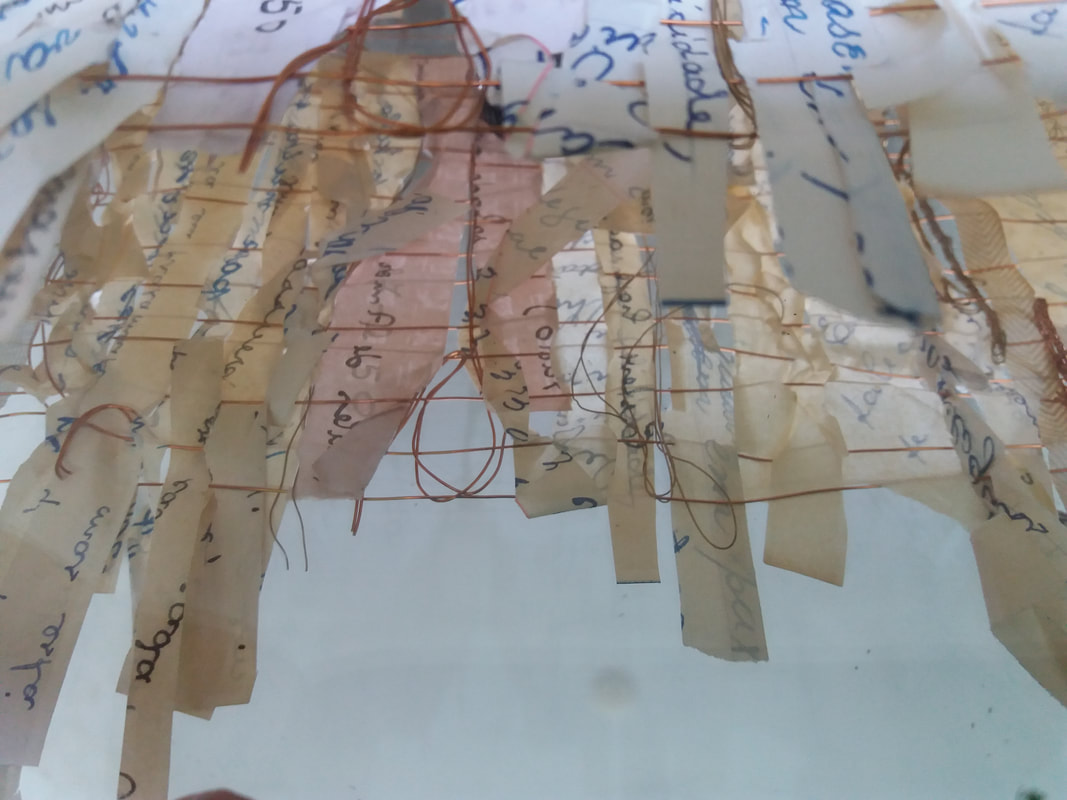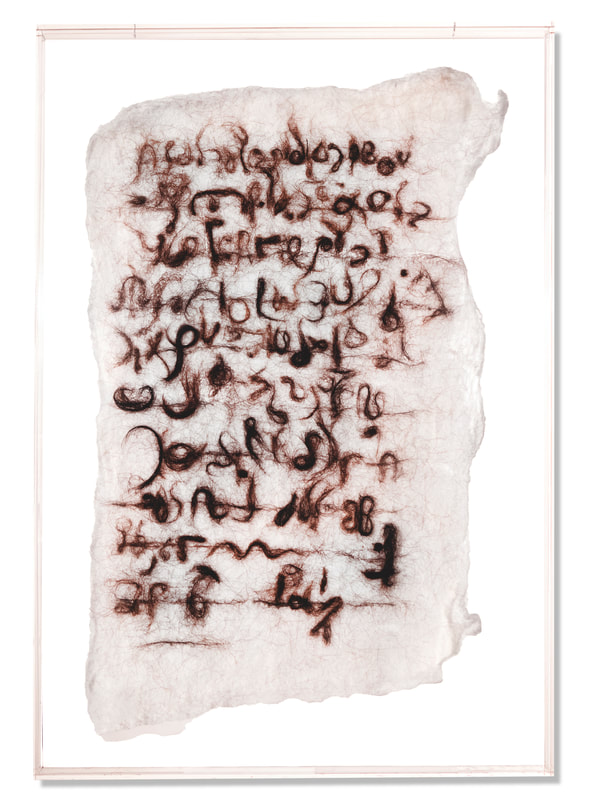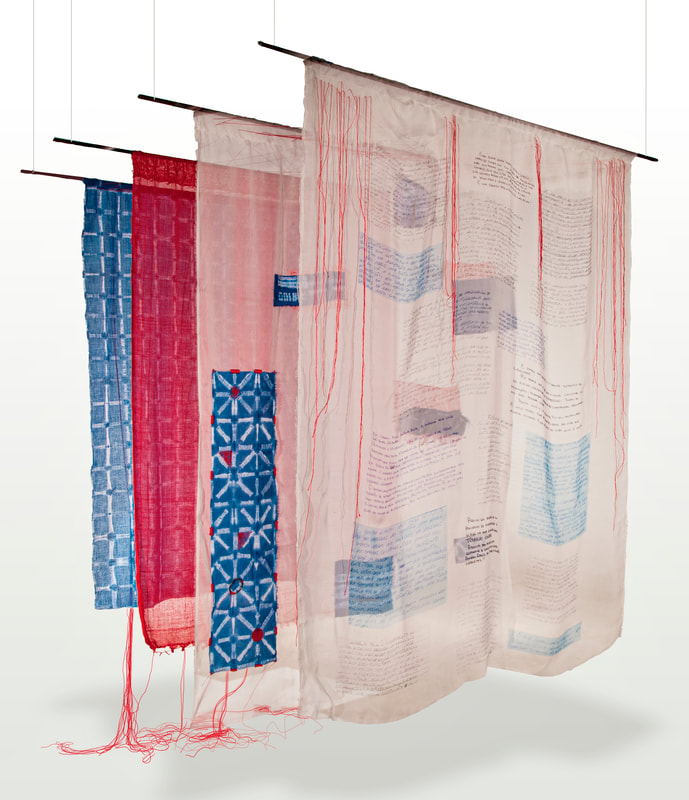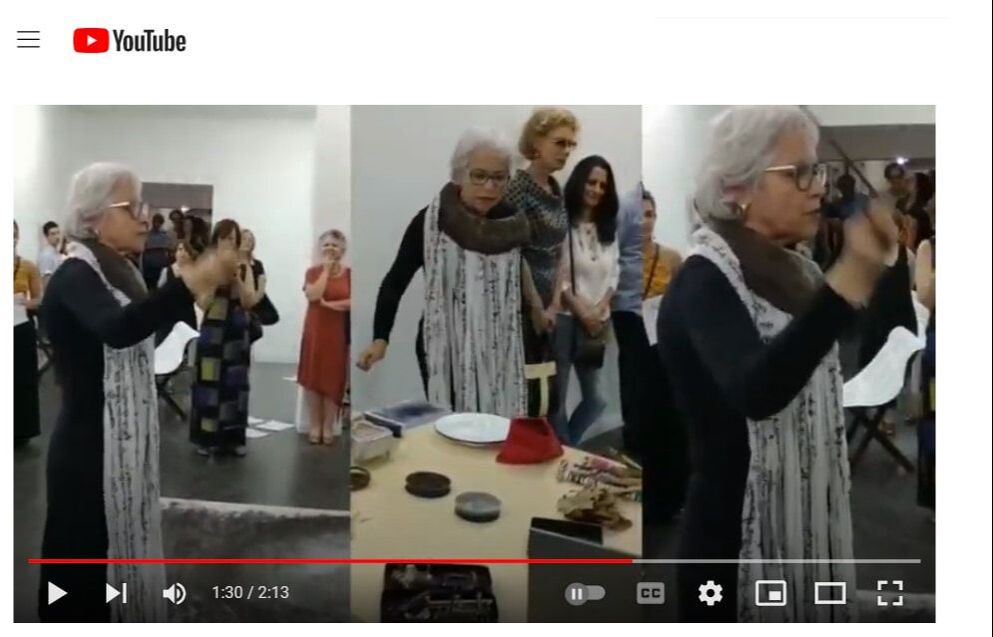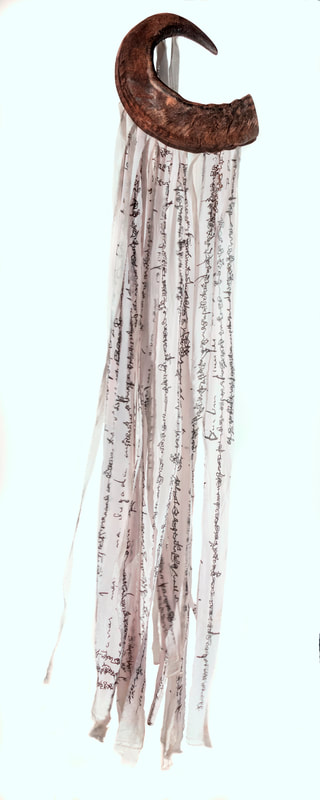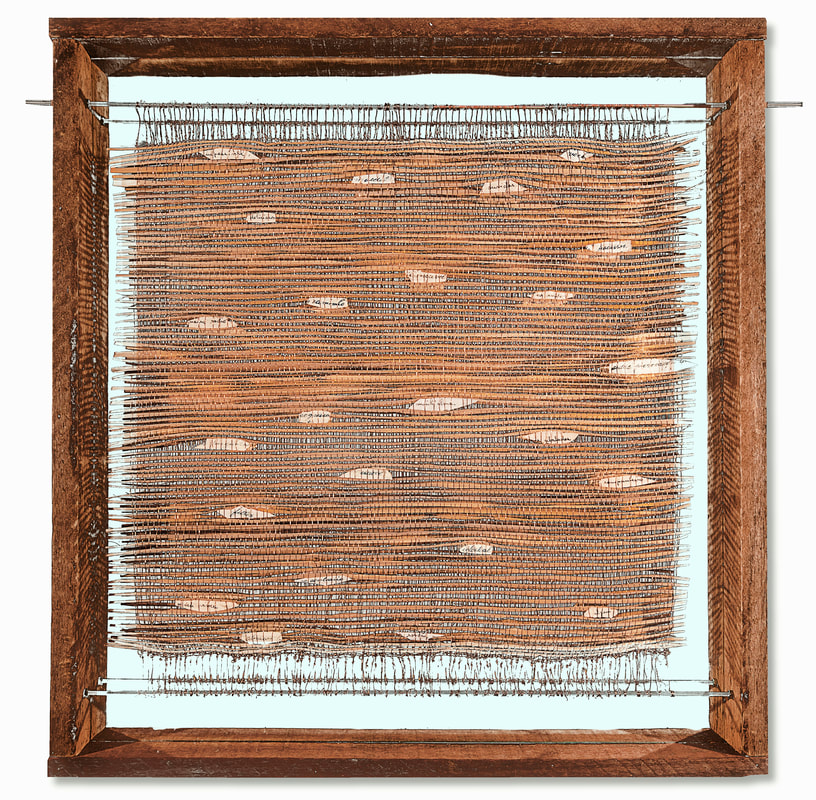|
I am so excited to introduce Lúcia Leão as a guest editor. I met her when I stayed at the Betsy Hotel by SWWIM (Supporting Women Writers in Miami) residency programs. Leão is originally from Brazil, and she occasionally travels between Miami and Chicago. When she is around, we visit the Art Institute of Chicago and talk about poetry, translation, and art. In this article, Leão curated visual poetry projects by a Brazilian artist/poet, Angela Quinto, along with a Brazilian poet, Dirceu Villa. --- NOTE: The majority of this interview and details are originally written in Portuguese. Leão translated them into English. INTRODUCING ANGELA QUINTO Lúcia Leão - Guest Editor When Naoko Fujimoto invited me to invite guests to her gallery, I thought of Brazilian artists and replicated Fujimoto’s gesture. I invited Dirceu Villa, a Brazilian poet who lives in São Paulo, to be part of the project. He helped me find and contact visual poets in Brazil. Angela Quinto is the first artist. The three of us are introducing to you in this vibrant collective space that Fujimoto’s Working on Gallery opens to us. Angela Quinto once said if she could be an animal, she would be a buffalo−or a termite, because of the kind of writing termites make, “so kindergartenish.” This is a compliment to termites, since for Angela, writing her presence in the world has been an act−many acts−of freeing interventions that go deep into the matter of composition. This Brazilian artist who lives in São Paulo is a poet, performer, weaver, and therapist. She was also a clown, part of a group called “Little Company of Mysteries and Nonsense,” with two other women. “Termites” is the title of her series Cupins. These insects entered her poetic perception more vividly when she had to take care of the furniture she inherited from her father’s printing business. Family history is also present in “Anyletters” (Quaisquercartas), in which she used the letters exchanged by her parents during their engagement period (1950-1952) to create a space for what she calls instanternity. Angela’s brother was a typographer, and a visit to a printing press in São Paulo a few months after his death inspired her work “I lost my tongue abroad” (Perdi minha língua no estrangeiro). “It was like walking backward... In August 2022, she launched Fosse porque fosse (For Whatever Reason), “almost a poem, a hybrid text with an undefined territory” crossed by her “body-language,” after she experienced the kidnapping (her word) of a sibipiruna, a tree native to Brazil, across from her house. It is with the work of decomposition, the repetition of impressions, and of movable types that Angela engages her whole body. Using the fragmentation of her own work, she breaks unity−time and again−also with her voice. A friend who listened to her performance “ver o poema desmontado” (“see the poem disassembled,” link below) said her cat ran to the sliding door, probably thinking it had heard a bird sing. Angela’s work and her performances file the edges of circularity, of time, of types. Dirceu Villa[1] introduced Angela Quinto (1955 - current). Villa wrote that Quinto is composing a body of work (and, in this case, “body” is a very precise word) in Brazil that ranges from poetry to the visual arts, performance and ritual. Her amazingly inventive mechanism combines important references in Brazilian art, of such artists as Arthur Bispo do Rosário (1909-1989) and Hélio Oiticica (1937-1980), among many others. But her dynamic is unique in creating objects meticulously crafted with a deep knowledge of the graphic arts, with the manipulation of the object trouvé (breathing life into them when operating their transformation into figures of speech), with apt knitting of symbolic patterns, charged with meaning, allusive to the work of the ancient fiandeiras, composing talismans that become part of performances reenacting lost rituals. She also naturally brings together the three great ethnic origins of Brazil: Indigenous, African, and European (particularly, Portuguese). But this is only a part of her multiple visual and performative repertoire, which is also a part of her poetic writing. The word is as fundamental to her art as it was for the great Catalan master Joan Brossa (1919-1998). It is not a coincidence that both were fascinated by the circus, and have experimented with its unusual trickery, its distorted mirror-image of the world as a way into the deep recesses of the human experience. Angela Quinto writes poems that carry with them an amalgam of Brazilian traditions down to its linguistic labyrinth: she joins the modernist experiments of Mário de Andrade (1893-1945) in a book like Macunaíma (1928), and Guimarães Rosa (1908-1967), who would forge a new language based on Brazilian Portuguese, blending different etymologic, polyglot sources into a speech that would depict with inventiveness the way Brazilian sertanejos speak. Quinto doesn’t make polyglot reinventions of language as Rosa does: her particular way of writing is aware of a wide range of Brazilian speeches and their use, combining the Afro-Brazilian tradition of the candomblé, its rhythms, the chants of the Guarani people and a very keen knowledge of Brazilian and Portuguese traditions of poetry and song. --- [1] Dirceu Villa (1975) is a Brazilian author of seven books of poetry, the latest of which is ciência nova (2022). His work has been published in magazines and anthologies such as Rattapallax (USA), Alforja (Mexico), alba Londres (UK), Neue Rundschau (Germany), Retendre la corde vocale (France) and Atelier (Italy). He has translated Ezra Pound, Joseph Conrad, Mairéad Byrne, and Jean Cocteau into Portuguese. Cupins Termites - Angela Quinto Interviewed and Translated by Lúcia Leão 3.100 known species, less than 10% are pests, bioindicators of ecosystem health, they contribute to water retention, porosity and aeration of the soil, help in the carbon-hydrogen balance, are a source of protein and resources for the production of medicines, feed on cellulose, wood, grasses, herbaceous plants, nocturnal creatures almost blind, they act almost in secret, térmita, siriri, sililuia, ririruia, aleluia, arará, salalé, muchém, itapicuim, kupi’i. Termites are super decomposers. The traces they leave in decomposition suggest a writing. Considering that animals don't need to enter language, because they are already in it; the one that sensorially opens up to its cracks and that, without limitations, enters into a state of astonishment, opens new paths of knowledge. A writing analogous to the corporeal system, like the kindergarten language in children's drawings, like the footprints of birds on the sand, or even in Chinese ideograms. Consonance between text and image, language as a kind of algebra, an ancient voice, a powerful sound heard from silent creatures. Cartasquaisquer Anyletters - Angela Quinto Interviewed and Translated by Lúcia Leão My work seeks to contact experiences of life&death&life. It is an answer, in language, to loss, and although it uses art as an expanded field, it is poetry that gives it all its movements, and light. Cartasquaisquer (Anyletters) is a series of interventions in the letters that my parents exchanged from 1950 to 1952, which I received after they died. After a while, this familiar universe crossed another. During a walking trip through the Brazilian backlands, I started a poetic barter experience with someone in prison, a political prisoner* − In order to open words, to open paths, gestures that make worlds move. The creative process started with the most archaic manual aspect, the weaving of the original letters; weaving an answer of my own, bringing temporalities disconnected of meaning closer, and making the non-semantic writing appear where words escape−one of the characteristics of this series. From the raw materiality, I traveled to virtual experiments: enlarging, reducing, and photocopying copies. Now the whole body is caught in the interventions and in the territory where erasure and chance court the imperceptible. A new dimension emerges, the failure of language. From material to virtual, from virtual to failure, from failure to the non-word, from emptiness to concreteness, the word-thing is the hot core of the experience. To walk on letters and different grounds, to have in the needle, thread, and dye the basis for a transcultural worldview, to compose and wear a cloak to celebrate the encounter with another in diversity is to give words a new tactile-sounding body, is to allow modulations to thoughts, and so perhaps this word-body will come to occupy the place of instanternity. *Jorge Augusto Xavier de Almeida, leader of grassroots movements, Black, poor, and from the Northeast region of Brazil, was in prison from 2016 to 2021. No evidence against him was presented. Perdi minha língua no estrangeiro I lost my tongue abroad Translated by Lúcia Leão [1] “Ori” means “head” in Yoruba and “Oyá” is an Orisha, also known as Yansã. The silk strips have excerpts of the letters Angela’s mother, Irene, sent to Angela’s father. Angela is a daughter of Yansã, and here she mixes her biological mother and the Orisha. [2] cassofracasso – A play with sounds and meanings, mixing words such as “casso,” first-person present-tense of the verb “cassar” (to repeal, revoke) and “fracasso,” failure. The word “caço” that we also hear here, means “I hunt.” [3] Fogueiralta is a combination of two words, “fogueira” and “alta” – “bonfire” and “high.” Angela wrote this poem after she heard Camila, the daughter of Jorge Augusto Xavier de Almeida read her father’s letters, during Angela’s trip through the Brazilian backlands. Angela would later exchange letters with Jorge for five years. [4] quelêquelê: ponto feito – “Quelêquelê” is a word Angela created.”Ponto feito” is a “ebó,” an offering to a spiritual being. [5] Reerence to a song “Vela no Breu,” by Paulinho da Viola, a Brazilian guitarist, composer, and singer. Guest Editor:
Lúcia Leão is a translator and a writer originally from Rio de Janeiro, Brazil. Her work has appeared in South Florida Poetry Journal, SWWIM Every Day, Gyroscope Review, Chariton Review, Harvard Review Online, and elsewhere. It is also included in the anthology Grabbed: Poets and Writers on Sexual Assault, Empowerment & Healing. Lúcia holds a master’s degree in Brazilian literature (UERJ–RJ, Brazil) and a master’s degree in print journalism (University of Miami–FL, USA). She is a book reviewer for RHINO literary magazine, a volunteer copyeditor for South Florida Poetry Journal, and a board member for TCLA, a non-profit organization based in West Palm Beach, Florida. She has been living in South Florida for 30 years. Comments are closed.
|
Archives
July 2024
|
フジハブ
Welcome to FUJI HUB: Waystation to Poetry, Art, & Translation. This is not your final destination. There are many links to other websites here, so please explore them!
Welcome to FUJI HUB: Waystation to Poetry, Art, & Translation. This is not your final destination. There are many links to other websites here, so please explore them!
What are you looking for?
FUJI HUB Directory
Popular Sites:
Gallery of Graphic Poems
Working On Gallery
(Monthly New Article by Writers & Artists)
About Naoko Fujimoto
Contact
Naoko Fujimoto Copyright © 2024
FUJI HUB Directory
Popular Sites:
Gallery of Graphic Poems
Working On Gallery
(Monthly New Article by Writers & Artists)
About Naoko Fujimoto
Contact
Naoko Fujimoto Copyright © 2024
